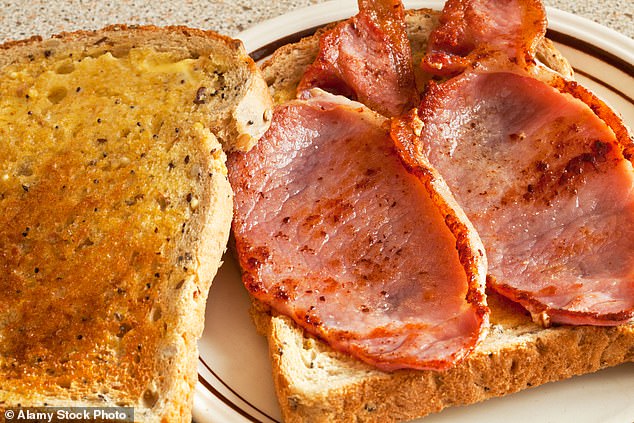Women who regularly eat processed meats such as bacon and ham may be significantly increasing their risk of developing breast cancer, a major study reveals.
Researchers found that women who ate processed meats at least once a week were 57 per cent more likely to develop breast cancer than those who avoided them.
The effect was strongest in women under the age of 50, they found.
The decade-long study, published in the peer-reviewed journal Clinical Nutrition, tracked more than 71,000 women aged 40 to 69.
Scientists believe the culprit is sodium nitrite – a preservative commonly used in processed meats – which can form cancer-causing compounds in the body, potentially damaging DNA and triggering mutations in breast tissue.
Sodium nitrite is used to kill bacteria in preserved meat, enhance flavour and keep bacon and ham looking pinker for longer.
While processed meats such as bacon and ham raised the breast cancer risk, the scientists said they ‘did not find a significant link between breast cancer risk and eating other types of meat’ such as pork and chicken, which are not preserved with nitrites.
A spokesman for UK-based campaigners the Coalition Against Nitrites said: ‘This is yet another alarming piece of evidence linking nitrite-cured processed meat with cancer.

Researchers found that women who ate processed meats like bacon at least once a week were 57 per cent more likely to develop breast cancer than those who avoided them
British families should not be unknowingly exposed to a substance that scientists say can generate carcinogens in the body.
‘The Government must now recognise the mounting evidence and take decisive action to remove nitrites from our food chain.
‘Safer alternatives exist – there is no reason to continue taking these risks with public health.’
The study by Seoul University reinforces warnings from the World Health Organisation’s International Agency for Research on Cancer, which classifies processed meat as a Group 1 carcinogen – the same category as tobacco, asbestos, Hepatitis B and arsenic.
Experts say that while genetics plays a role in breast cancer, factors including diet, alcohol consumption, smoking and obesity are increasingly important. In the UK more than 55,000 women a year are diagnosed with breast cancer.
David Lindars from the British Meat Processors Association said: ‘At every stage, the UK processing industry strictly adheres to regulations set by the Food Standards Agency and keeps nitrite and nitrate levels within the legal limits.
‘But there has also been significant and ongoing work by processors to reduce nitrites in cured pork products.
‘Working with the latest scientific research, our producers have, over several years, been implementing new methods to get nitrite use as low as possible without jeopardising public health.’
He added: ‘In fact, BMPA members have achieved up to a two-thirds reduction in the need for nitrite use in products, which is well below the FSA limits.’
This article was originally published by a www.dailymail.co.uk . Read the Original article here. .

